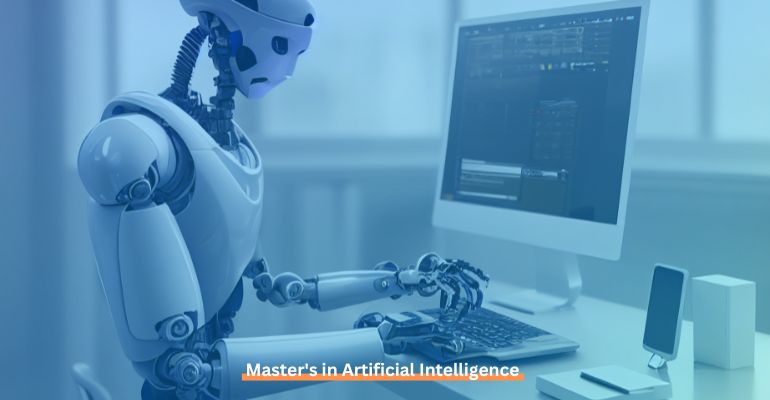10 Essential Skills Developed in a Master’s in Artificial Intelligence
January 9, 2024 2024-04-25 6:0710 Essential Skills Developed in a Master’s in Artificial Intelligence

10 Essential Skills Developed in a Master’s in Artificial Intelligence
Overview of Master’s in Artificial Intelligence
Master’s in Artificial Intelligence: The AI turned the planet on its head when it was released to the general public. Today, the market is already flooded with a breadth of job opportunities for those quick to master it. However, its widespread acceptance also means one thing. It means students today are rapidly learning technical skills in this popular field. Given how things work, these trained workers will have a far better chance at job interviews in the future.
First things first, what does a Master’s in AI mean?
Simply put, it is a postgraduate program that cultivates the required skills and knowledge about artificial intelligence (AI). Similarly to other Master’s programs, it generally takes anywhere from one to two years to finish full-time. This varies consistent with the course location and structure.
As is often imagined, it aims to prepare students for professional roles incorporating AI. Several of the things students learn as a part of this are often AI research, application, and development.
The modules are designed to blend technical expertise with broader abilities that are vital for career success. Thus, graduates absorb a sizeable amount of the topic and domain as a whole.
So, what are these diverse tools and skills that will make a difference? What is a master’s in artificial intelligence likely to teach?
10 Essential Skills Developed during a Master’s in AI
Programming and Software Development:
As perhaps many are already aware, proficiency in programming languages is required. These languages include Python, Java, and, therefore, the ever-popular C++. Together, they assist professionals in developing AI applications and algorithms.
Data Analysis and Machine Learning:
The course will emphasize the importance of mastering machine learning techniques. Some examples of these are supervised and unsupervised learning, as well as deep learning. The techniques also include reinforcement learning. Graduates have to be ready to analyze and interpret data. This goes double for voluminous data. However, the most important thing is the capacity to extract meaningful insights from the information at hand.
Algorithm Design and Optimization:
Designing and building problem-solving algorithms is one of the most crucial skills experts possess. In this scenario, algorithm efficiency is important because it impacts scalability and performance. Correspondingly, Master’s in Artificial Intelligence courses have incorporated it into modules.
Mathematics and Statistics:
As much as we love or hate it, the domain is strongly tied to a robust mathematical and statistical foundation. Indeed, concepts like calculus, algebra, and probability are rudimentary to comprehending and developing AI algorithms.
Natural Language Processing:
As anyone who has interacted with AI is aware, human language processing lies at the core of it. The modules will skyrocket student expertise in sentiment analysis. Aside from that, it creates text summarization and language generation experts. This permits the program to know and process human language while increasing performance.
Computer Vision:
Computer vision—what is it?
It’s the ability and process of AI systems to comprehend visual stimuli. Common examples of what computer vision includes are videos and pictures. As you can imagine, it’s a key facet of AI-generated operations and visual production. As a result, it’s an important component of getting a Master’s in AI.
Automation and robotics:
Understanding robotics principles is an important skill for aspiring AI professionals. This is often very true when it involves automating systems. These applied techniques also aid in the better control and management of an equivalent.
Ethical and responsible AI:
As AI technology may be a relatively new market disruption, the planet remains adapting to its incorporation. The recent case of OpenAI’s founder, Sam Altman, and his sudden dismissal by its board are food for thought. We believe that it highlights the necessity for future AI professionals to remember the ethics of AI.
And we aren’t alone in thinking so. Thus, because of widespread demand, the module will cover topics associated with ethics. For example, accountability, bias, fairness, and transparency.
Problem-solving and important thinking:
A common need across industries and platforms. All postgraduate courses across every industry cover the fundamentals of critical thinking and problem-solving. A “master’s in artificial intelligence,” more so. Given its newness, the AI domain, in particular, would require the expertise of its professionals. This is often because AI challenges and problem-solving will only get more complex and competitive over time.
Communication and Collaboration:
Another commonly required essential skill is strong communication and collaboration, which is also a basic professional necessity. Within the AI industry, this might appear as collaborating with interdisciplinary teams and conveying technical and non-technical directives. Further, this might even be necessary across industries and teams counting on the KPIs of the role.
Read the relevant blog: Career Advancement for Master’s Degree Courses in Dubai
Conclusion
Beyond this, graduates from Master’s in Artificial Intelligence courses are typically trained to adapt rapidly. it’s easy to ascertain why this technical digital field demands this. Professionals get to learn throughout their careers and stay updated on industry trends. they’re going to have to merge technical and domain-specific talents with those outside of it. Why? To navigate a fast-paced landscape and maintain a holistic approach to projects.





